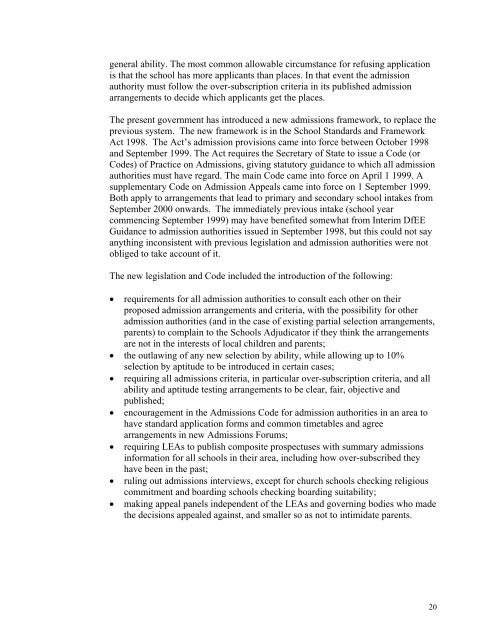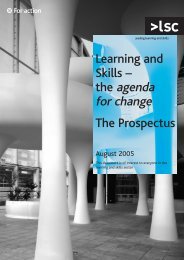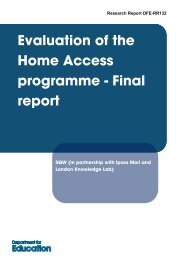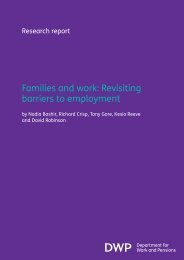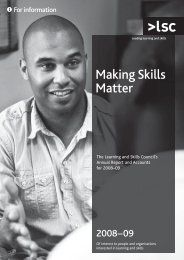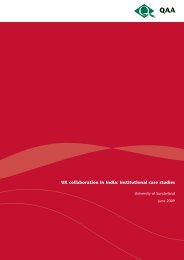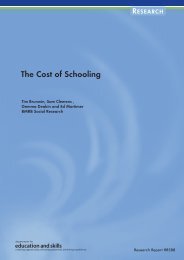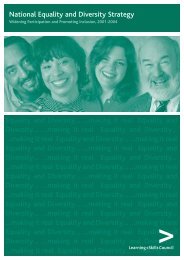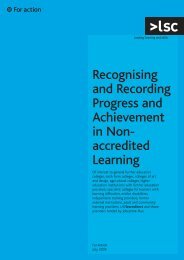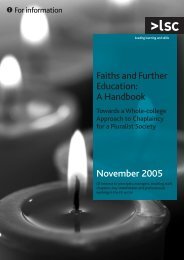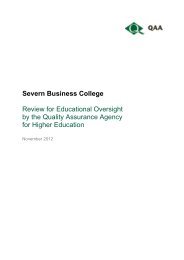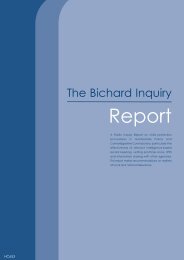Parents' Experiences of the Process of Choosing a Secondary School
Parents' Experiences of the Process of Choosing a Secondary School
Parents' Experiences of the Process of Choosing a Secondary School
Create successful ePaper yourself
Turn your PDF publications into a flip-book with our unique Google optimized e-Paper software.
general ability. The most common allowable circumstance for refusing application<br />
is that <strong>the</strong> school has more applicants than places. In that event <strong>the</strong> admission<br />
authority must follow <strong>the</strong> over-subscription criteria in its published admission<br />
arrangements to decide which applicants get <strong>the</strong> places.<br />
The present government has introduced a new admissions framework, to replace <strong>the</strong><br />
previous system. The new framework is in <strong>the</strong> <strong>School</strong> Standards and Framework<br />
Act 1998. The Act’s admission provisions came into force between October 1998<br />
and September 1999. The Act requires <strong>the</strong> Secretary <strong>of</strong> State to issue a Code (or<br />
Codes) <strong>of</strong> Practice on Admissions, giving statutory guidance to which all admission<br />
authorities must have regard. The main Code came into force on April 1 1999. A<br />
supplementary Code on Admission Appeals came into force on 1 September 1999.<br />
Both apply to arrangements that lead to primary and secondary school intakes from<br />
September 2000 onwards. The immediately previous intake (school year<br />
commencing September 1999) may have benefited somewhat from Interim DfEE<br />
Guidance to admission authorities issued in September 1998, but this could not say<br />
anything inconsistent with previous legislation and admission authorities were not<br />
obliged to take account <strong>of</strong> it.<br />
The new legislation and Code included <strong>the</strong> introduction <strong>of</strong> <strong>the</strong> following:<br />
• requirements for all admission authorities to consult each o<strong>the</strong>r on <strong>the</strong>ir<br />
proposed admission arrangements and criteria, with <strong>the</strong> possibility for o<strong>the</strong>r<br />
admission authorities (and in <strong>the</strong> case <strong>of</strong> existing partial selection arrangements,<br />
parents) to complain to <strong>the</strong> <strong>School</strong>s Adjudicator if <strong>the</strong>y think <strong>the</strong> arrangements<br />
are not in <strong>the</strong> interests <strong>of</strong> local children and parents;<br />
• <strong>the</strong> outlawing <strong>of</strong> any new selection by ability, while allowing up to 10%<br />
selection by aptitude to be introduced in certain cases;<br />
• requiring all admissions criteria, in particular over-subscription criteria, and all<br />
ability and aptitude testing arrangements to be clear, fair, objective and<br />
published;<br />
• encouragement in <strong>the</strong> Admissions Code for admission authorities in an area to<br />
have standard application forms and common timetables and agree<br />
arrangements in new Admissions Forums;<br />
• requiring LEAs to publish composite prospectuses with summary admissions<br />
information for all schools in <strong>the</strong>ir area, including how over-subscribed <strong>the</strong>y<br />
have been in <strong>the</strong> past;<br />
• ruling out admissions interviews, except for church schools checking religious<br />
commitment and boarding schools checking boarding suitability;<br />
• making appeal panels independent <strong>of</strong> <strong>the</strong> LEAs and governing bodies who made<br />
<strong>the</strong> decisions appealed against, and smaller so as not to intimidate parents.<br />
20


